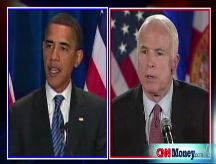Uncle Sam: $407 billion in the hole
Deficit up by $246 billion in a year. Federal agency cites 'substantial increase in spending' and 'halt' in tax revenue growth. Also says it will add Fannie and Freddie to future estimates.
 |
| Federal budget agency forecast deficits above $400 billion for the next two years. |
NEW YORK (CNNMoney.com) -- The budget deficit will jump by $246 billion to $407 billion this year, the Congressional Budget Office estimates in a report released Tuesday.
"Over the long run, growing budget deficits and the resulting increases in federal debt would lead to slower economic growth," the agency said.
The budget deficit shot up 153% from last year's shortfall of $161 billion. The government's fiscal year ends Sept. 30. The agency attributes the jump to "a substantial increase in spending and a halt in the growth of tax revenues."
That drop in revenue is driven in part by an estimated 15% decline in corporate tax receipts. They fell as a result of lower corporate profits and tax rules governing how businesses depreciate their investments this year. A second factor is the rebates provided to tax filers from the economic stimulus law Congress passed earlier this year.
The spending hike is partly due to efforts by the government "to cover the insured deposits of insolvent financial institutions," the agency said.
To date, 11 banks have been seized by the FDIC this year - not a high number historically, but higher than it's been in recent years - and that number is expected to grow in the coming months.
The CBO said it expected the deficit to exceed $400 billion - or 3% of gross domestic product - for each of the next two years if current policies remain in place. It also forecast several more months of "very slow" economic growth.
"The nation is experiencing a significant period of economic weakness," said Peter Orszag, director of the CBO, in a press briefing.
The CBO's estimate for the cumulative deficit over the next 10 years is now $2.3 trillion. Earlier this year, the CBO estimated the country would have a $300 billion surplus by 2018. But that was wiped out in part because of new spending approved by lawmakers for the war in Iraq and Afghanistan and revised economic projections.
And the 2.3 trillion figure doesn't account for the likelihood that the 2001 and 2003 tax cuts will be extended or that the middle class will continue to be protected from the Alternative Minimum Tax - or so-called wealth tax. If those extensions are made - and both presidential nominees have been calling for that, at least in part - then the 10-year deficit projection jumps to more than $7 trillion.
The agency's latest estimates do not reflect the Treasury announcement this weekend that the government would temporarily takeover Fannie Mae and Freddie Mac, the two government-sponsored enterprises that form the backbone of the mortgage market.
But Orszag said that come January, the CBO will be incorporating the activities of Fannie and Freddie in its baseline for the federal budget. The CBO will be working with House and Senate budget committees to address questions of just how transactions by both companies should be accounted for - the answers to which will greatly influence the net effect the companies have on the federal deficit.
"The degree of control exercised by the federal government is so strong that the best treatment is to incorporate [the agencies] into the federal budget," Orszag said.
To allay one concern that many taxpayers have expressed, the roughly $5 trillion in loans that Fannie and Freddie own or back would not be added wholesale to the debt held by the public, Orszag told CNNMoney.com.
"I don't see a scenario in which you take a total of the mortgages backed and add that to the federal deficit," he said.
But beyond all these near-term concerns affecting the government's debt load, he said the biggest challenge facing the country's coffers is rising health care costs. Federal spending on Medicare and Medicaid alone is expected to jump 30% in the next decade - from 4.6% of GDP this year to 6% in 2018. By 2050, it could jump to 12% of GDP.
As a result, Orszag said in the press briefing, "The nation is on an unsustainable fiscal course." ![]()





